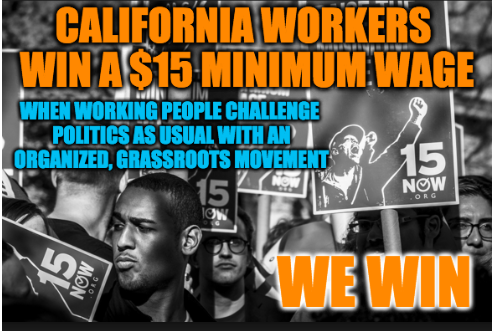After a two year movement of rallies, strikes and actions, low-wage workers in Minneapolis won the first Earned Sick and Safe Time (ESST) policy in the Midwest. By passing ESST, City Hall unanimously agreed to take responsibility for workplace conditions, as a result of increasing pressure from escalating demonstrations by low-wage workers and a powerful coalition. This further shows City Council can pass our campaign’s proposal for $15/hour as an ordinance at any time.
Sick time was one issue in a suite of workers’ rights demands, including $15, that City Hall hesitated against taking action on in the fall. In response, workers organized and forced the city to take action, with escalating demonstrations demanding sick days, a $15 minimum wage, and an end to wage theft, including one rally of hundreds that brought downtown traffic to a halt back in February.
Pro-business policies have left Minneapolis with some of the worst in the nation racial equity gaps, despite also also having the highest concentration of Fortune 500 companies in the country. “City Hall felt urgency when big business lobbied for the Vikings Stadium,” said Ginger Jentzen, Executive Director of 15 Now Minnesota. “City Hall should feel the same urgency to pass $15 as they did to strike a deal for the Wilf brothers.”
Mayor Hodges has said she does not support raising wages at a city level but stood with workers on sick time, and City Attorney Susan Segal has raised questions of bringing $15/hour as a charter amendment. “Passing sick time shows it’s legal to put a $15 minimum wage to voters in Minneapolis, and we aim to get the signatures to show that 20% of our win number in the fall supports putting the $15 decision back into the hands of Minneapolis workers,” said Ginger Jentzen.
Minneapolis taking the initiative on paid sick days has spurred other cities to follow suit. St. Paul and Duluth are now considering their own paid sick time policies. Demonstrations in Minneapolis have raised workers’ confidence in cities across our region.
82% of Minneapolis voters support a phased in $15/hour minimum wage. This widespread support can be seen in the fact that In just five weeks, over 10,000 people have signed the ballot initiative for a $15/hour minimum wage. The $15 for Mpls campaign is working to verify signatures collected to ensure it meets the threshold of 7,000 to qualify. Over 400 individual donors have contributed a median donation of $6 — that’s how much more, per hour, minimum wage workers will earn if we win $15/hour
But it took a movement and powerful organization of working people in Minneapolis to win safe and sick time. By linking pro-worker policies and increased membership in unions to win $15, we’re building a method to reverse the economic devastation working people have faced under decades of waiting for big business to voluntarily enact policies which benefit workers. Pascual Tapia, CTUL member and retail janitor said, “I am happy to see that my work helped open the space to win paid sick days in Minneapolis.”

